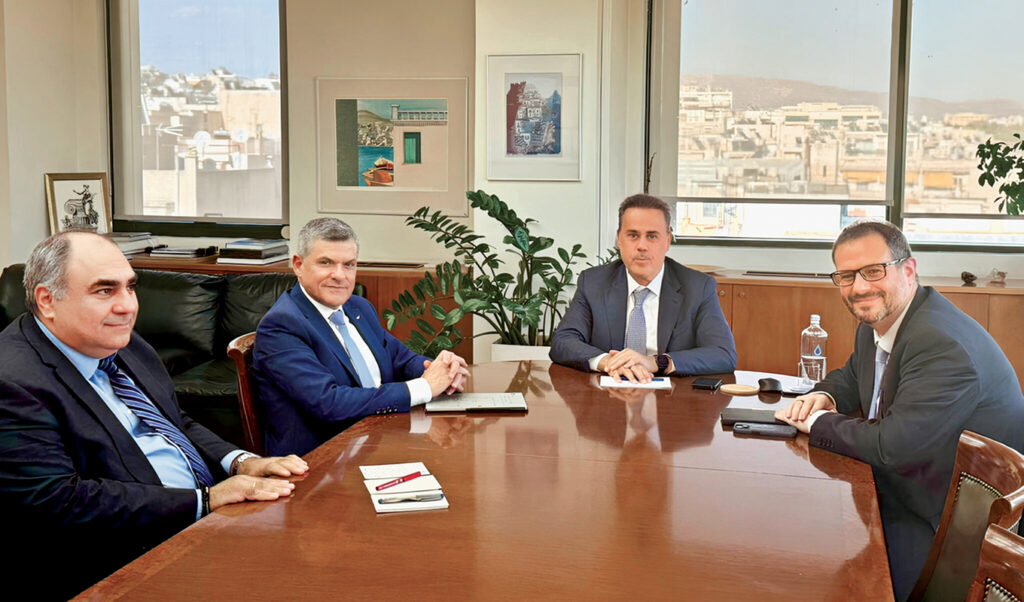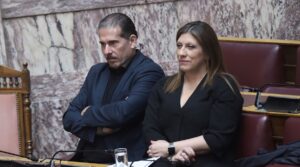Athens and Nicosia appear determined to take the necessary steps to complete the electrical interconnection between Greece – Cyprus – Israel (Great Sea Interconnector, formerly EuroAsia Interconnector), which represents one of the largest and most ambitious underwater power transmission projects worldwide.
Cable project: Papstavrou and Papanastasiou coordinate efforts
Following Thursday’s meeting in Athens between Environment and Energy Minister Stavros Papstavrou and his Cypriot counterpart Georgios Papanastasiou, they agreed to arrange a meeting as soon as possible between the two regulators (RAE and CERA) and the implementation body (IPTO), while next Tuesday a teleconference will take place on the issue, with the participation of European Union Energy Commissioner Dan Jørgensen.
In the meantime, during the few days that remain, both sides will work intensively to resolve some pending issues and present themselves in absolute harmony with tangible progress in the discussion with the Commission’s commissioner.
Challenges of the undersea cable project
Problems had already begun to emerge in 2023, when EuroAsia Interconnector (note: IPTO took over management on January 1, 2024) announced it had awarded French company Nexans a submarine cable contract worth €1.43 billion for the section of the electrical interconnection linking Cyprus to Greece.
Since that period, the French multinational company and the Commission have been pressing for commitments and guarantees from all parties regarding financing and implementation of this major project. The section under construction between Cyprus and Greece, terminating in Crete, spans 898 kilometers and has received €657 million in funding from the Connecting Europe Facility mechanism.
Geopolitical tensions and Turkish interference
The problems acquired geopolitical characteristics following events south of Kasos and the tension scenario orchestrated by Turkey. The research vessel tasked with surveying and laying electrical cables on the section of the electrical interconnection from Crete to Cyprus was harassed by Turkish warships. The Greek side, however, assured that the Italian research vessel “Ievoli Relume” completed its work – conducted in international waters within the Greek EEZ as delimited with Egypt – and withdrew after conducting surveys for submarine cable laying.
However, when shortly afterward, according to sources, a senior government official from our country expressed his displeasure to a senior Turkish government official on the sidelines of an international forum regarding Turkey’s stance on this issue, the Turkish official reportedly responded in their private conversation that Cyprus doesn’t really want the project either. It was during that period that Athens was constantly receiving information about questioning of the project’s viability in Nicosia, as well as business and economic interests that didn’t want its implementation, as they would lose significant revenue from the energy market.
It is a project that Kyriakos Mitsotakis has characterized as emblematic, emphasizing that it has a “deep geopolitical footprint,” while he has stressed that he attaches great importance to its implementation
Harsh statements from Cyprus
The Great Sea Interconnector is a project that Kyriakos Mitsotakis has characterized as emblematic, emphasizing that it has a “deep geopolitical footprint,” while he has stressed that he attaches great importance to its implementation. Foreign Minister Georgios Gerapetritis assures at every opportunity that it will proceed and that it concerns maritime research for laying surface electrical cables that is absolutely protected by International Law.
Thus, this past August there was initial displeasure in Athens from the position taken by Cyprus’s Finance Minister Makis Keravnos, who expressed serious reservations about the viability and implementation of the electrical interconnection project. A short time earlier, Greek diplomacy had achieved a significant “victory” with the public position taken by France’s president at the plenary of the third UN Ocean Conference in Nice, which didn’t come by chance.
“We must protect our EEZs. And we must be uncompromising when the territorial sovereignty of some of our partners is threatened. I refer to our friends, the Greeks or the Cypriots. We must protect our territorial waters and airspace everywhere,” Emmanuel Macron said characteristically during his intervention. The displeasure – although never publicly expressed – became even greater last Sunday when Cyprus’s president Nikos Christodoulides made unusually harsh statements, significantly raising the tone.
“If the head of IPTO thinks that the Cypriot government is being blackmailed with such letters or paid advertisements, he obviously doesn’t know who he’s dealing with. The Cypriot government is not blackmailed by any head of IPTO and the Cypriot government is here to support only the interests of the Cypriot people. This is the clear message to the head of IPTO,” Christodoulides said, responding to a question about an article in Cyprus’s “Phileleftheros” newspaper.
According to the report, IPTO is reacting to the Republic of Cyprus’s delay in paying the agreed first installment of €25 million, requesting a larger amount from the Cyprus Energy Regulatory Authority (CERA).
Kyriakos Mitsotakis – who had privately discussed this issue with Christodoulides in New York – decided to move along two lines: First, that Greece-Cyprus relations remain unshaken regardless of this project’s development. Second, that the project will proceed if the economic-technical pending issues are resolved. The two energy ministers and the two regulatory authorities are now called upon to work intensively in this direction.
Published in Parapolitika




